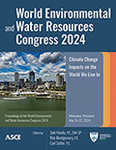PFAS and Their Effects on Municipal Water Processing and Systems
Publication: World Environmental and Water Resources Congress 2024
ABSTRACT
The contaminant(s) per- and polyfluoroalkyl substances (PFAS) is on critical attention at the municipal drinking water treatment plants (MWTPs) or public water systems (PWSs), and water resource recovery facilities (MWRRFs). The 5th Unregulated Contaminant Monitoring Rule (UCMR) requires 29 PFAS compounds to be monitored at the small to large PWSs. Following USEPA’s PFAS Strategic Roadmap with Research, Restrict, and Remediate integrated goal-approach, while potential PFAS-Source(s) have been under a critical review, a clean water action is also underway verifying on categorical industrial wastewater effluent dischargers via Effluent Guidelines Program Plan 15 (Plan 15); in addition, public input is initiated under the Comprehensive Environmental Response, Compensation, and Liability Act (CERCLA) toward a feasible rulemaking on applicable PFAS. The Toxics Release Inventory (TRI) now requires applicable industrial facilities to report on certain PFAS, under the Emergency Planning and Community Right-to-Know Act (EPCRA). Given the ongoing regulatory review and USEPA proposing individual maximum contaminant level (MCL) of 4.0-ppt on perfluorooctanoic acid (PFOA) and perfluorooctane sulfonic acid (PFOS) and, a hazard index (HI) of 1.0 on another four PFAS, implications to the operation of PWSs and MWRRFs are significant as the treatment required in liquid processing train(s) and handling of solids for safe environmental removal of PFAS. Applicable PFAS-treatment processes and technologies for water treatment have been identified, and associated costs (as projected) would be significant for the municipal water utilities. Thus, this work includes a comprehensive evaluation on contaminant-PFAS, PFAS removal in municipal water processing, and potential cost effects to municipal water systems.
Get full access to this chapter
View all available purchase options and get full access to this chapter.
REFERENCES
Abulikemu, G., et al. (2023). Granular Activated Carbon Uptake of PFAS: Assessment of Rapid Small-Scale Column Test Scaling Assumptions. 20th Anniversary Drinking Water Workshop: Small System Challenges and Solutions, September 11-14, 2023, Covington KY.
GAO. (2022a). Technology Assessment – Persistent Chemicals – Technologies for PFAS Assessment, Detection, and Treatment. GAO-22-105088 (JUL’22).
GAO. (2022b). Persistent Chemicals – EPA Should Use New Data to Analyze the Demographics of Communities with PFAS in Their Drinking Water. GAO-22-105135 (SEP’22).
Chitikela, S. R., Gullapalli, V., and Ritter, W. F. (2019). “Treated and Regulated Effluents of the U.S. Municipal Wastewater to Making Direct Potable Reuse (DPR).” Proceedings of World Environmental and Water Resources Congress, May 19-23, 2019, Pittsburgh PA.
Chitikela. (2023). “Operator Training (5-hr.): Treated and Regulated Wastewater Effluents – Reuse and Direct Potable Reuse (DPR),” “Conditioning and Dewatering of Municipal Water/Wastewater Solids,” and, “Ethics and Water Professionals.” 2 B/ O&M Water & Wastewater (Both) Contact Hours, May 9th, Annual Training Conference, Exhibition, & Golf Outing (May 8-10, 2023), ORWA OH.
ITRC (Interstate Technology & Regulatory Council). (2023). PFAS Technical and Regulatory Guidance Document and Fact Sheets PFAS-1. Washington, D.C.: Interstate Technology & Regulatory Council, PFAS Team. https://pfas-1.itrcweb.org, accessed November 29, 2023).
Knappe, D. (2023). PFAS Treatment. 20th Anniversary Drinking Water Workshop: Small System Challenges and Solutions, September 11-14, 2023, Covington KY.
MPCA. (2023). Evaluation of Current Alternatives and Estimated Cost Curves for PFAS Removal and Destruction from Municipal Wastewater, Biosolids, Landfill Leachate, and Compost Contact Water. (May 2023).
Mills. (2020). PFAS Treatment in Biosolids – State of the Science. PFAS Science Webinars for USEPA Region 1 and State & Tribal Partners (September 2020).
Speth, T. (2023a). Managing PFAS Treatment Residuals. 20th Anniversary Drinking Water Workshop: Small System Challenges and Solutions, September 11-14, 2023, Covington KY.
Speth, T. (2023b). PFAS in Drinking Water – Centralized Treatment. 20th Anniversary Drinking Water Workshop: Small System Challenges and Solutions, September 11-14, 2023, Covington KY.
40CFR. (2023). Title 40 Code of Federal Regulations – Protection of Environment. (https://www.ecfr.gov/current/title-40, accessed December 2023).
42USC. (2023). The United States Code (USC). Title 42—The Public Health And Welfare (https://uscode.house.gov/browse/prelim@title42&edition=prelim, accessed December 1, 2023).
UCMR-5. (2023). The Fifth Unregulated Contaminant Monitoring Rule (UCMR 5) – Data Summary; EPA 815-S-23-004, October 2023.
USEPA. (2021). PFAS Strategic Roadmap: EPA’s Commitments to Action; EPA-100-K-21-002 (October’21).
USEPA. (2023a). PFAS Analytical Methods Development and Sampling Research. (https://www.epa.gov/water-research/pfas-analytical-methods-development-and-sampling-research, accessed December 1, 2023).
USEPA. (2023b). Questions and Answers: Drinking Water Health Advisories for PFOA, PFOS, GenX.
USEPA. (2023c). 40CFR Parts 141 and 142; PFAS National Primary Drinking Water Regulation Rulemaking. US Federal Register, Vol. 88(60), March 29, 2023, Proposed Rules.
USEPA. (2023d). Effluent Guidelines – Program Plan 15. EPA-821-R-22-004 (JAN’23).
USEPA. (2023e). Per- and Poly-Fluoroalkyl Chemical Substances Designated as Inactive on the TSCA Inventory; Significant New Use Rule. US Federal Register, Vol. 88(17), January 26, 2023, Proposed Rules.
USEPA. (2023f). Implementing Statutory Addition of Certain Per- and Polyfluoroalkyl Substances (PFAS) to the Toxics Release Inventory Beginning With Reporting Year 2023. US Federal Register, Vol. 88(120), June 23, 2023, Rules and Regulations.
USEPA. (2023g). Designation of Perfluorooctanoic Acid (PFOA) and Perfluorooctanesulfonic Acid (PFOS) as CERCLA Hazardous Substances. US Federal Register, Vol. 87(171), September 6, 2022, Proposed Rules.
USEPA. (2023h). AP-42 – Compilation of Air Pollutant Emissions Factors (MAY 2023).
Voice, G., Ciobanu, C., Istrate, I. A., and Tudor, P. (2020). Emissions Control of Hydrochloric and Fluorhydric Acid in Cement Factories from Romania. International Journal of Environmental Research and Public Health, 17 (1019).
Wang, J., Lin, Z., He, X., Song, M., Westerhoff, P., Doudrick, K., and Hanigan, D. (2022). Critical Review of Thermal Decomposition of Per- and Polyfluoroalkyl Substances: Mechanisms and Implications for Thermal Treatment Processes. Environmental Science & Technology, 56 (5355–5370).
Information & Authors
Information
Published In
History
Published online: May 16, 2024
ASCE Technical Topics:
Authors
Metrics & Citations
Metrics
Citations
Download citation
If you have the appropriate software installed, you can download article citation data to the citation manager of your choice. Simply select your manager software from the list below and click Download.
